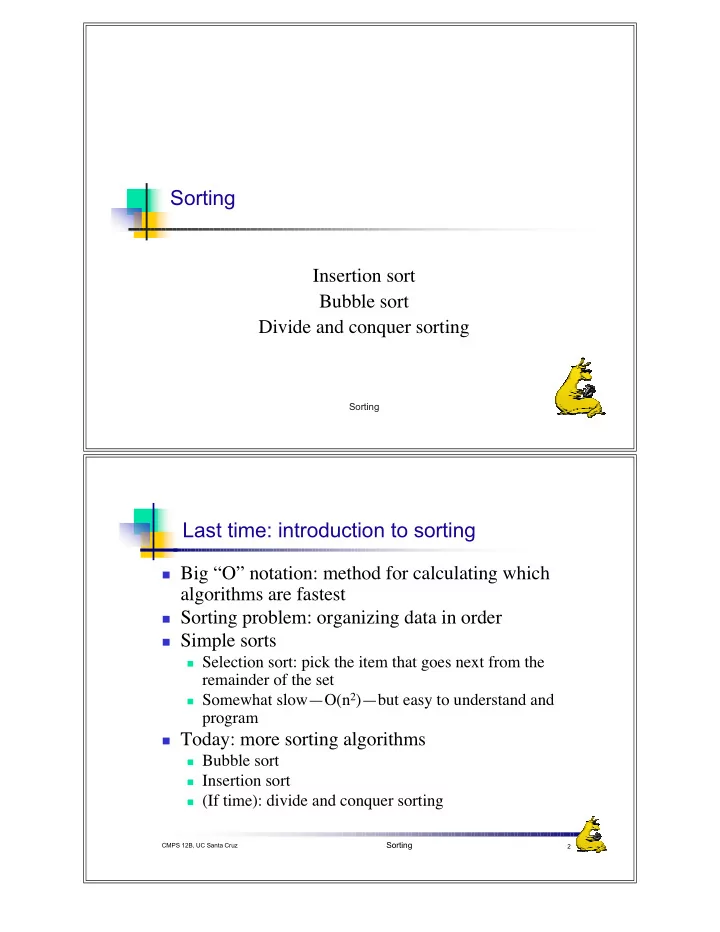

Sorting Insertion sort Bubble sort Divide and conquer sorting Sorting Last time: introduction to sorting � Big “O” notation: method for calculating which algorithms are fastest � Sorting problem: organizing data in order � Simple sorts � Selection sort: pick the item that goes next from the remainder of the set � Somewhat slow—O(n 2 )—but easy to understand and program � Today: more sorting algorithms � Bubble sort � Insertion sort � (If time): divide and conquer sorting CMPS 12B, UC Santa Cruz Sorting 2
Bubble sort � Basic idea: run through the array, exchanging values that are out of order � May have to make multiple “passes” through the array � Eventually, we will have exchanged all out-of-order values, and the list will be sorted � Easy to code! � Unlike selection sort, bubble sort doesn’t have an outer loop that runs once for each item in the array � Bubble sort works well with either linked lists or arrays CMPS 12B, UC Santa Cruz Sorting 3 Bubble sort: code Code is very short and simple � do { Will it ever finish? � done = 1; � Keeps going as long as at least for (j = 0; j < nItems-1; j++) { one swap was made if (arr[j] > arr[j+1]) { temp = arr[j]; � How do we know it’ll eventually arr[j] = arr[j+1]; end? arr[j+1] = temp; Guaranteed finish: finite number � done = 0; of swaps possible } } � Large elements “bubble” to the } while (!done); end of the array � Outer loop runs at most nItems-1 times Generally not a good sort � � OK if a few items slightly out of order CMPS 12B, UC Santa Cruz Sorting 4
Bubble sort: running time � How long does bubble sort take to run? � Outer loop can execute a maximum of nItems-1 times � Inner loop can execute a maximum of nItems-1 times � Answer: O(n 2 ) � Best case time could be much faster � Array nearly sorted would run very quickly with bubble sort � Beginning to see a pattern: sorts seem to take time proportional to n 2 � Is there any way to do better? � Let’s check out insertion sort CMPS 12B, UC Santa Cruz Sorting 5 What is insertion sort? 8 22 26 30 15 4 40 21 8 15 22 26 30 4 40 21 4 8 15 22 26 30 40 21 4 8 15 22 26 30 40 21 � Selection sort: find the next element in the sorted list from the rest of the unsorted list � Insertion sort: place the next element in the unsorted list where it “should” go in the sorted list � Other elements may need to shift to make room � May be best to do this with a linked list… CMPS 12B, UC Santa Cruz Sorting 6
Pseudocode for insertion sort while (unsorted list not empty) { pop item off unsorted list for (cur = sorted.first; cur is not last && cur.value < item.value; cur = cur.next) { ; if (cur.value < item.value) { insert item after cur // last on list } else { insert item before cur } } for (j = 1; j < nItems; j++) { curr = arr[j]; for (k = j-1; (k>=0) && (arr[k]>curr); k--) { arr[k+1] = arr[k]; } arr[k+1] = curr; } CMPS 12B, UC Santa Cruz Sorting 7 How fast is insertion sort? � Insertion sort has two nested loops � Outer loop runs once for each element in the original unsorted loop � Inner loop runs through sorted list to find the right insertion point � Average time: 1/2 of list length � The timing is similar to selection sort: O(n 2 ) � Can we improve this time? � Inner loop has to find element just past the one we want to insert � We know of a way to this in O(log n) time: binary search! � Requires arrays, but insertion sort works best on linked lists… � Maybe there’s hope for faster sorting CMPS 12B, UC Santa Cruz Sorting 8
How can we improve sorting speed? � Why is sorting so slow? � We have to iterate over the entire unsorted array � Operations for each item we’re sorting take time O(n) � Attack the problem by breaking it into smaller pieces: divide and conquer � Break the array in half � Sort each half � Merge the two halves together � Is this any faster? � May be faster because merging is easier than sorting… CMPS 12B, UC Santa Cruz Sorting 9 Sorting by merging: mergesort � Break the data into two (equal) halves � Recursively sort each half the same way � How many levels of splits do we have? � Each level takes time O(n) � We have O(log n) levels! � This means that total required time is O(n log n)! � It works because we can sort smaller pieces � Merging is very fast: O(n) CMPS 12B, UC Santa Cruz Sorting 10
Recommend
More recommend